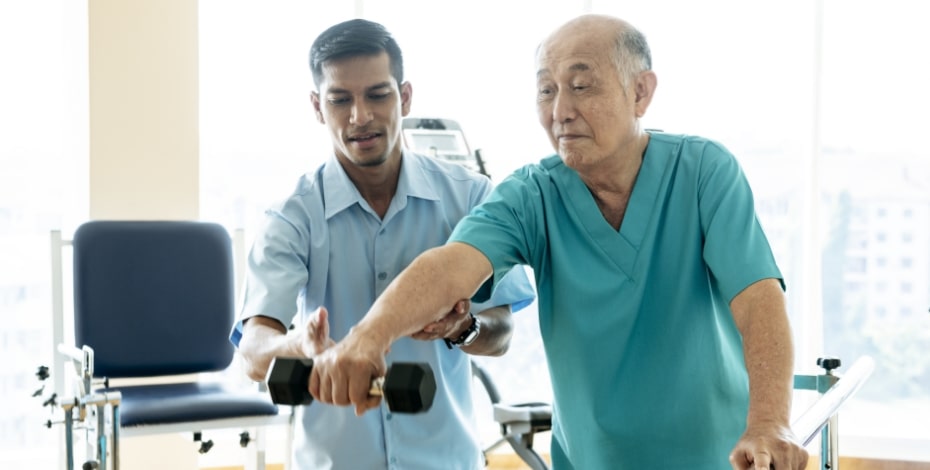
Taking culture into consideration

In our recent podcast series Researchers on the Record, clinician and researcher Bernadette Brady talks about the importance of understanding how a patient’s culture might affect their physiotherapy experience.
Patient engagement is a key factor in the successful delivery of healthcare.
However, it can be difficult to achieve that engagement when patients come from culturally and linguistically diverse backgrounds—patients don’t always engage the way we may expect or with what we want.
Further, if we don’t consider culture and cultural differences in the way we deliver treatment, there is every chance that a patient won’t participate and may even drop out of treatment entirely.
Sydney-based clinician and researcher Dr Bernadette Brady APAM MACP suggests that taking a culturally responsive approach that recognises a patient’s cultural background and its influence on the illness experience can improve engagement and patient satisfaction.
‘I work in South Western Sydney, which is a very multicultural area.
'A lot of the clients that I work with are from diverse cultural backgrounds and speak languages other than English,’ says Bernadette, an APA Pain Physiotherapist, an APA Musculoskeletal Physiotherapist and a clinical physiotherapist and clinician researcher at Liverpool Hospital in South Western Sydney.
Bernadette observed that patients from specific cultural backgrounds who were attending physiotherapy for chronic pain conditions were not responding in the same way as patients from English speaking or Western communities.
It started her thinking about the role of culture.
‘Why are some people getting better and others not?
'What role does culture—someone’s journey and life story—play in their clinical presentation?
'I started to reflect on how little I understood about this and how little I actually paid attention to these things during my physio assessment and treatment planning,’ Bernadette says.
As a PhD student, she started to look at how people from different cultural backgrounds experience pain and how this could be used to adapt pain management approaches.
Initially, she focused on relationship building and qualitative research, identifying key stakeholders from each community who were engaged with and interested in the process.
In 2016, she successfully applied for a Physiotherapy Research Foundation Seeding Grant to fund a randomised controlled trial evaluating the feasibility of adapting different approaches to chronic pain for different cultures and communities.
Bernadette’s study compared engagement and treatment outcomes in two Middle Eastern cultures, Mandaean and Assyrian, as well as a Vietnamese culture, chosen for their presence in her local health district.
‘Because of the funding, I was able to include the three different cultures that I had started working with.
'That was important because we didn’t want to just say that it is feasible to adapt a treatment to suit a community.
'We wanted to say that it is feasible for physiotherapists to adapt their assessment and treatments to suit different communities using the same structured approach.
'It’s really about the idea of cultural adaptation as opposed to a single cultural adaptation,’ Bernadette says.
The results of the randomised controlled trial were published in 2018, showing that a culturally adapted approach to treatment results in greater engagement, higher satisfaction and some small changes in outcomes measuring pain-related suffering.
‘Our patients had greater engagement… people were attending; people were participating in treatment.
'We had high levels of satisfaction in patients who received the culturally adapted approaches compared to usual care,’ Bernadette says.
The results have had a direct effect on the way treatments are delivered in hospitals and clinics in the South Western Sydney Local Health District.
‘We now run culturally adapted treatment programs based on these principles. We’ve adopted the approaches that we explored in our main studies and so patients who come into the clinics have the option of doing the culturally adapted program as part of their usual care,’ Bernadette says.
Meanwhile, she has continued to build on the idea of cultural adaptation and cultural tailoring, with the aim of making it a more sustainable practice adaptable to individual patients and communities.
‘We’re looking at implementing a partnership model of care, where we are able to work effectively with patients and with communities to be able to adapt our approaches on an individual patient level… models of care that can be both patient-centred and culturally responsive,’ she says.
Click here to hear Bernadette Brady discuss her research in the Researchers on the Record podcast. Check out the other episodes while you’re there.
© Copyright 2024 by Australian Physiotherapy Association. All rights reserved.





